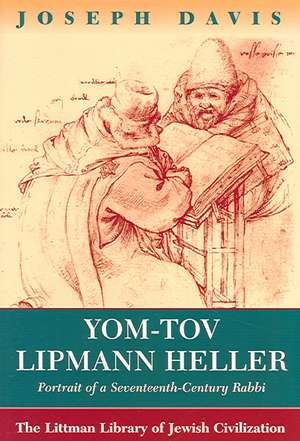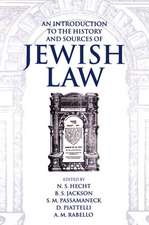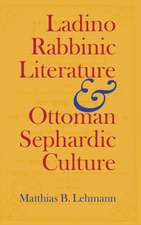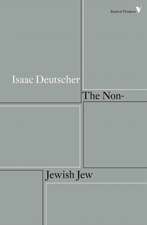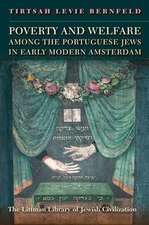Yom–Tov Lipmann Heller – Portrait of a Seventeenth–Century Rabbi
Autor Joseph Davisen Limba Engleză Paperback – 29 iun 2005
Preț: 286.73 lei
Nou
Puncte Express: 430
Preț estimativ în valută:
54.87€ • 57.08$ • 45.30£
54.87€ • 57.08$ • 45.30£
Carte tipărită la comandă
Livrare economică 14-28 aprilie
Preluare comenzi: 021 569.72.76
Specificații
ISBN-13: 9781904113324
ISBN-10: 190411332X
Pagini: 320
Dimensiuni: 156 x 234 x 17 mm
Greutate: 0.45 kg
Ediția:Revised
Editura: LUP – Littman Library
ISBN-10: 190411332X
Pagini: 320
Dimensiuni: 156 x 234 x 17 mm
Greutate: 0.45 kg
Ediția:Revised
Editura: LUP – Littman Library
Cuprins
List of abbreviations Introduction A Rabbinic Life * The Six Pillars * Philosophy and Mysticism in Ashkenazi Culture * Social Rabbis * The Politics of Seventeenth-Century Jews * Persecutions and Plagues * Satan in Goray Part I The Ladder of Ascension, 1578-1617 1The Orphan The Orphan * Wallerstein, 1578 * Marriage in a Prominent Family * The Maharal of Prague * The New Curriculum * The Examination of the World 2The Exile of a Philosopher The Flowering of Philosophical Study among Ashkenazi Jews * Joseph ben Isaac and Givat haMoreh * 'A dwarf on the Shoulders of a Giant' * The Plague of 1611 * The Exile of a Philosopher 3Two Kabbalists Isaiah Horowitz and the 'Repudiation of Philosophy' * Heller as Kabbalist * On Magic, Magidim, and the Individual Self * On Esotericism, Non-Kabbalistic Judaism, and the Purposes of Prayer * In Defence of Philosophy 4 Tosafot Yom Tov The Maharal and the Revival of the Mishnah * On Rashi, Tosafot, and the Seventy Faces of Torah * The Exegetical Experience * Letter to Worms, 1616 5 Jews and Gentiles The Nikolsburg Wine Controversy of 1616 * On Non-Jewish Bread and Non-Jewish Books * On Humanizing the Non-Jews * Against Trinitarianism, 1619 * On Unity Part II The Trial, 1618-1630 6Prague in Wartime The Defenestration of Prague, 1618 * Letter to Vienna, 1619 * Fears * Prague, 1620: Habsburg Loyalist * On Providence and Miracles *Jacob Bassevi * The Plague of 1625 7The Chief Rabbi 'Who are the Kings? The Rabbis * Rabbinic Activism and Educational Reform * 'Delights of the King' * Against the Shulhan arukh * On Humility * Interpretations and Decisions * The Constitutions of the Jews * The Title Page * Letter to Frankfurt, 1628 8The Trial The Arrest * In the Prison of Vienna * Deliverance * Explanations * On Politics * Again on Non-Jews * A Day of Remembrance Part III Change and Defeat, 1631-1654 9The Sermon From Prague to Poland * 'The Lessening of the Moon' * Midrashic Natural History * On the New Astronomy * On Change * The Maharal and the Illusion of Self * The Acceptance of Suffering 10 Attacks and Retreats To the Edge of Europe * Again on the Shulhan arukh * On Honour * The Ban on the Purchase of Rabbinic Office * Permission to Publish Kabbalah 11 A Rabbi's Autobiography The Coronation, 1644 * Deliverance Narrative and Autobiography * On Silence * Family * On Himself 12The Massacres of 1648 The Twentieth Day of Sivan * Fasting and Silence * Two Kinds of Messianism * Demonizing the Cossacks * The Absence of the King * 'You Have Become a Plague' * Letter to Checiny, 1651 Yom-Tov Lipmann Heller's Extant Works and Writings Bibliography Index
